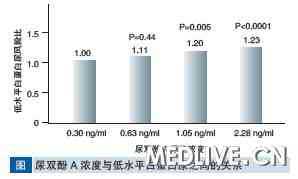PNAS:母亲暴露于双酚A(BPA)中会改变后代的大脑功能和行为
2013-05-30 Pnas 生物360
日前,美国哥伦比亚大学的一项最新研究显示,反复暴露在低剂量的塑化剂双酚A(BPA)中的雌性小鼠,其后代表现出了大脑DNA甲基化和基因表达的长期持续性的具有性别特异性的变化,还表现出了焦虑样行为。 在这项最新研究中,科学家每天给予怀孕小鼠各种浓度的双酚A(BPA),这其中包括低于被认为对人类“安全”的浓度的剂量。低剂量的双酚A(BPA)逆转了幼年雄性和雌性后代大脑雌激素受体基因表达模式的性别差异。
日前,美国哥伦比亚大学的一项最新研究显示,反复暴露在低剂量的塑化剂双酚A(BPA)中的雌性小鼠,其后代表现出了大脑DNA甲基化和基因表达的长期持续性的具有性别特异性的变化,还表现出了焦虑样行为。
在这项最新研究中,科学家每天给予怀孕小鼠各种浓度的双酚A(BPA),这其中包括低于被认为对人类“安全”的浓度的剂量。低剂量的双酚A(BPA)逆转了幼年雄性和雌性后代大脑雌激素受体基因表达模式的性别差异。这些变化伴随着为甲基加入DNA进行催化的、具有性别特异性变化的酶的表达,还伴随着一个雌激素受体基因的有差别的甲基化。
此外,研究人员表示,双酚A(BPA)暴露诱导产生了持续的、性别特异性的、剂量依赖的社会行为的变化,诸如嗅探、追逐和攻击频率的变化。双酚A(BPA)暴露还改变了产后母亲的行为,诸如舔、梳洗和照料幼崽,但是研究人员发现母亲的这些变化并不是造成在其后代中观察到的那些改变的原因。
这些发现表明低剂量的产前双酚A(BPA)暴露可能诱导产生持续的大脑DNA甲基化变化,这可能是双酚A(BPA)对大脑功能和行为的长期持续效应的基础。

Sex-specific epigenetic disruption and behavioral changes following low-dose in utero bisphenol A exposure
Abstract
Bisphenol A (BPA) is an estrogenic endocrine disruptor widely used in the production of plastics. Increasing evidence indicates that in utero BPA exposure affects sexual differentiation and behavior; however, the mechanisms underlying these effects are unknown. We hypothesized that BPA may disrupt epigenetic programming of gene expression in the brain. Here, we provide evidence that maternal exposure during pregnancy to environmentally relevant doses of BPA (2, 20, and 200 µg/kg/d) in mice induces sex-specific, dose-dependent (linear and curvilinear), and brain region-specific changes in expression of genes encoding estrogen receptors (ERs; ERα and ERβ) and estrogen-related receptor-γ in juvenile offspring. Concomitantly, BPA altered mRNA levels of epigenetic regulators DNA methyltransferase (DNMT) 1 and DNMT3A in the juvenile cortex and hypothalamus, paralleling changes in estrogen-related receptors. Importantly, changes in ERα and DNMT expression in the cortex (males) and hypothalamus (females) were associated with DNA methylation changes in the ERα gene. BPA exposure induced persistent, largely sex-specific effects on social and anxiety-like behavior, leading to disruption of sexually dimorphic behaviors. Although postnatal maternal care was altered in mothers treated with BPA during pregnancy, the effects of in utero BPA were not found to be mediated by maternal care. However, our data suggest that increased maternal care may partially attenuate the effects of in utero BPA on DNA methylation. Overall, we demonstrate that low-dose prenatal BPA exposure induces lasting epigenetic disruption in the brain that possibly underlie enduring effects of BPA on brain function and behavior, especially regarding sexually dimorphic phenotypes.
本网站所有内容来源注明为“梅斯医学”或“MedSci原创”的文字、图片和音视频资料,版权均属于梅斯医学所有。非经授权,任何媒体、网站或个人不得转载,授权转载时须注明来源为“梅斯医学”。其它来源的文章系转载文章,或“梅斯号”自媒体发布的文章,仅系出于传递更多信息之目的,本站仅负责审核内容合规,其内容不代表本站立场,本站不负责内容的准确性和版权。如果存在侵权、或不希望被转载的媒体或个人可与我们联系,我们将立即进行删除处理。
在此留言











#PNAS#
65
#大脑功能#
61
#BPA#
71
#双酚A#
82
#脑功能#
55